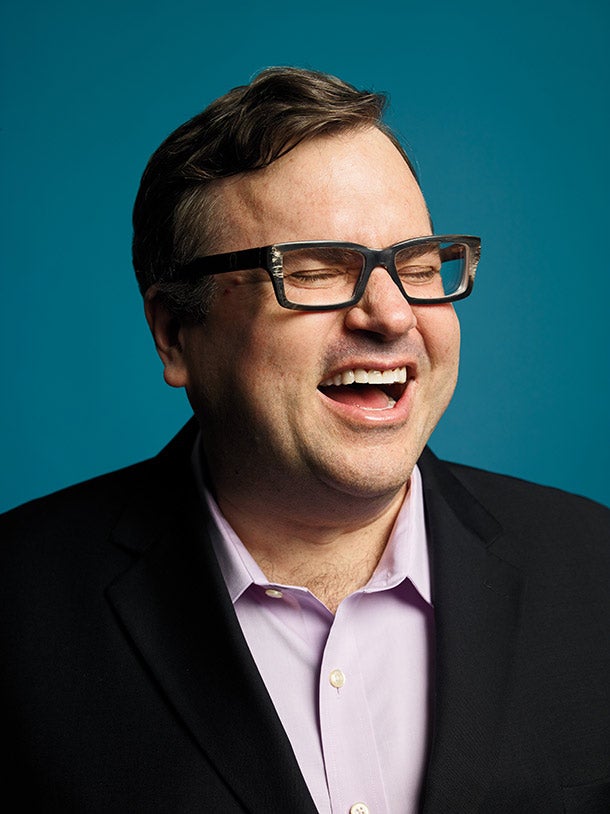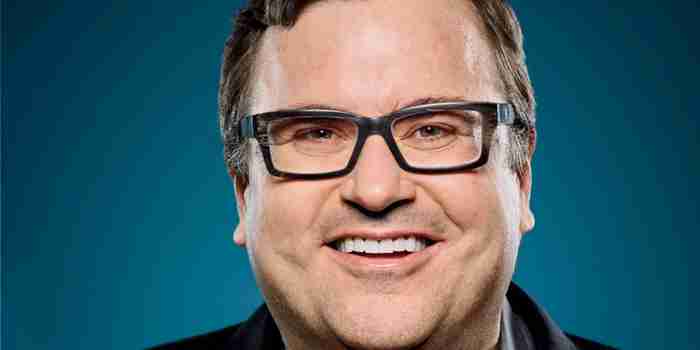He's the billionaire co-founder of LinkedIn, Greylock Partner, a mentor to many, and, starting in May, the host of a new podcast called 'Masters of Scale.' Here, Hoffman gives us an inside look at how he teaches entrepreneurs to grow successful businesses. You can see him writing those words down in his mind: the learning loop. “The world’s better off the more Silicon Valleys there are,” he says, “and the more scaled companies there are.” So how do you scale a company? Before Shah could utter a word, Hoffman said, “The answer to your question is yes.” Hoffman not only invested but also joined the board -- and has stayed there ever since. Kiva’s innovative technology platform helps would-be entrepreneurs across the world get funding. In Silicon Valley, the OODA loop of your decision-making is effectively what differentiates your ability to succeed.” The critical point Hoffman is always trying to get across -- in his books, his podcasts, his interviews with journalists and his mentoring sessions with company founders -- is that no one really knows what is going to happen next. “We have all this PalmPilot technology,” says Hoffman, “and this is the thing that makes us cool, and then, at the end of the week, we’re like, No no, these are our customers; it’s actually, in fact, the email payments on eBay that matter!” Today, when company founders are seeking Greylock’s funding, Hoffman and his partners will look for signs of learning loop capacity. Hoffman (of course) has a name for the mindset of the successful entrepreneur. This means you need to be adapting all the time.
He’s the billionaire co-founder of LinkedIn, Greylock Partner, a mentor to many, and, starting in May, the host of a new podcast called ‘Masters of Scale.’ Here, Hoffman gives us an inside look at how he teaches entrepreneurs to grow successful businesses.

This story appears in the May 2017 issue of Entrepreneur. Subscribe »
Editor’s Note: In the new podcast Masters of Scale, LinkedIn co-founder and Greylock partner Reid Hoffman explores his philosophy on how to scale a business — and starting May 3, at Entrepreneur.com, entrepreneurs are responding with their own ideas and experiences. This story is an in-depth look at Hoffman and his philosophy. This article is included in Entrepreneur Voices on Growth Hacking, a new book containing insights from more than 20 contributors, entrepreneurs, and thought leaders.
Dan Lewis has been wrestling with one of the most common, and critical, bottlenecks that bedevil every tech startup seeking to scale fast: How can his company staff up quickly enough to cope with expected growth without blowing through cash unsustainably? Lewis is the CEO and co-founder of Convoy, an on-demand trucking startup headquartered in Seattle, so the first idea he had felt obvious. He should open up a second office in a city that’s way cheaper than Seattle.
But he just wasn’t sure. Which is why, on a Friday evening in early March, he’d trekked down to Silicon Valley to meet a man known to have answers to quandaries like this: Reid Hoffman.
The two men sit down at the Sand Hill Road offices of Greylock Partners. Greylock, where Hoffman is a partner, led a round of financing for Convoy in early 2016. Hoffman now sits on the company’s board. “So what shall we talk about today?” he asks. “Customers, or recruiting?”
“Recruiting,” Lewis answers.
Lewis dives into the details of his problem, and Hoffman settles into a posture that looks well-used. He steeples his hands in front of his chin, fingertips almost touching his lips, elbows splayed sharply to the left and right. His eyes might be half-closed, but his body language is benevolent; he could not possibly be more attentive.
And when Lewis is done, Hoffman has plenty to say. If Convoy does pursue a second office, they’d better make sure direct flights are available from the new city back to Seattle. Requiring execs to regularly make multiple-stop cross-country journeys plays hell with company culture. It’s a minor point, but one you might never think of unless you’d been there yourself.
But splitting up corporate teams may be premature, Hoffman adds. It runs the risk of disrupting “the learning loop” — that all-important, constantly iterating process in which a startup figures out how best to do whatever it’s doing by observing itself in action and making the necessary course adjustments.
Lewis nods. You can see him writing those words down in his mind: the learning loop. This, after all, is the effect Hoffman has on people. It’s why the 49-year-old billionaire co-founder of LinkedIn, veteran of PayPal and venture capitalist is widely considered something of a seer in Silicon Valley, who can distill complex ideas down to important truisms. It’s why he’s now expanding into media with a podcast called Masters of Scale; each episode explores his often counterintuitive theories on how businesses can grow, such as “the only way to scale is to do things that don’t scale,” and includes conversations with friends such as Sheryl Sandberg and Bill Gates. (It runs for 10 weeks, starting May 3.) For founders wrestling with big, sticky questions about their companies’ promise and direction, a few words from Hoffman can go a long way. A conversation can go even further.
That’s why Lewis and his cofounder chose Greylock as their lead investor. “Reid can go into the weeds and say, ‘Here is how to think of an onboarding experience for a product, here’s how to think of a marketplace, here’s how to think of a recruiting growth strategy,” Lewis says later. Another beneficiary of Hoffman’s capital and wisdom, Kiva president Premal Shah, concurs: “Reid gets in the foxhole with you.”
But for Hoffman, getting into weeds and foxholes isn’t just about helping the individuals he’s invested in. It’s about something greater — something that, he hopes, will push all entrepreneurs to grow their companies strongly and smartly. It’s about nurturing an adaptable mindset suitable for navigating a confusing, chaotic world. All in the hope of making that world better for everyone.

Born in Palo Alto, raised in Berkeley, educated at Stanford and Oxford, Reid Hoffman is a very smart guy. He originally wanted to be a philosopher, but he also wanted to have a concrete impact on the world, and eventually he concluded that abstract reasoning in academia wasn’t going to give him the scale to get him or the world to where it needed to be. In the mid-’90s in Silicon Valley, the lure of the digital revolution was irresistible. He got the lay of the land from gigs at Apple and Fujitsu and, in 1997, started his first company, a primitive social networking operation called SocialNet.
SocialNet failed, but Hoffman recalls the experience as invaluable. After SocialNet, Hoffman joined his college friend Peter Thiel on the board at PayPal, where he soon became the COO and then executive vice president. eBay’s subsequent purchase of PayPal in 2002 for $1.5 billion made Hoffman a multimillionaire. He began investing in startups and co-founded LinkedIn in 2003. He joined Greylock in 2009. In 2016, Microsoft purchased LinkedIn for a whopping $26 billion. (Hoffman joined Microsoft’s board of directors in March.) Among the startups he has helped mentor: Airbnb. Mozilla. Zynga. Groupon. Greylock declined to provide details on Hoffman’s current net worth, but after the sale of LinkedIn concluded, Forbes calculated it at $3.7 billion.
But a funny thing happened on the way to billionaire-dom. Reid Hoffman, capitalist par excellence, ended up becoming a philosopher anyway. He has written two books — The Startup of You and The Alliance — and is working on a third, Blitzscaling, which is an adaptation of a course he taught last year at Stanford with Greylock partner John Lilly. All three drop heavy doses of knowledge on how to form the proper entrepreneurial mindset. Hoffman’s philosophy is based on the principle that entrepreneurialism is a force for good. He is convinced that in the long run, more Silicon Valley-style innovation will lead to greater prosperity and more jobs. “The world’s better off the more Silicon Valleys there are,” he says, “and the more scaled companies there are.”
So how do you scale a company?
That’s where it gets interesting.

“Entrepreneurship is throwing yourself off a cliff and assembling an airplane on the way down.” -Reid Hoffman
Premal Shah first met Reid Hoffman at PayPal. In 2006, after Shah joined Kiva, a nonprofit that crowdsources microloans to people around the world, he recalls chasing Hoffman down in a parking lot hoping to get his one-time colleague to invest in the nonprofit. Before Shah could utter a word, Hoffman said, “The answer to your question is yes.”
Hoffman not only invested but also joined the board — and has stayed there ever since. Kiva’s innovative technology platform helps would-be entrepreneurs across the world get funding. That meshes perfectly with Hoffman’s desire to encourage entrepreneurial productivity — and he believes big platforms can connect people in important ways.
Plus, even nonprofits need to scale. Shah remembers back in 2012, when Hoffman began hammering that point in board meetings. Kiva…

COMMENTS